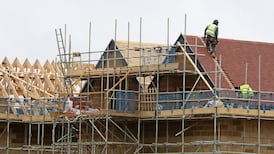THE GOVERNMENT should consider setting up a second “bad bank” to deal with distressed loans at the banks that are not moving to the National Asset Management Agency (Nama), chairman of Anglo Irish Bank Alan Dukes has said.
It seemed logical that if the banks had to deal with distressed assets outside Nama, they should be dealt with in one place, he said.
“That way we would have two major banks [AIB and Bank of Ireland] with cleaned up major balance sheets that would immediately become better prospects for market funding,” he said in a speech to Leinster Society of Chartered Accountants Ireland.
He said he was not suggesting Anglo’s planned asset recovery bank be used as a platform but that it would be part of it. Anglo’s proposed asset recovery bank was going to be doing the same job as Nama, he said.
About €6.6 billion of development loans originally to be moved to Nama from AIB and Bank of Ireland will now remain at the banks after the threshold on eligible loans was increased last month from €5 million to €20 million to speed up the transfers.
“It is common cause that even after the whole Nama operation has been completed – and the sooner that is done the better – there will still be some distressed assets left at the banks and they will have to be dealt with.”
Only land and development and associated loans should be dealt with by this entity, and not mortgages or credit card debt, he said.
He also suggested that the Irish units of overseas banks – which are pulling out of Ireland or reducing their Irish operations – could be put together with Anglo’s proposed funding bank to create a viable bank to compete with the big two, AIB and Bank of Ireland.
Speaking to reporters, Mr Dukes said Nama “will not have dealt with the whole problem” if there are still distressed assets left at the banks after it takes over €74 billion in loans from the lenders. The second bad bank would would require capital from the Government, he said, but he did not think the banks needed more capital to deal with these loans. A second bad bank would simply manage the loans better. “If people agree with the idea, we would have to sit down [to plan] a structure for it and how to run it.”
Mr Dukes said he didn’t know how many more losses would be incurred on non-Nama loans. “That would depend on what happens to property markets. I am not sure we have seen the end of property reductions – I would hope that we have.”
Anglo’s funding position was still “very difficult” but “not critical”. The bank had sent the European Commission the revised Government plan for the creation of the funding and asset recovery banks out of Anglo, he said.
He confirmed that the bank was on the shortlist to take over Quinn Insurance – which is owned by Seán Quinn who owes Anglo about €2.8 billion – out of administration. Mr Dukes said the fiscal deficit should be corrected as quickly as possible. “The longer you spin out the adjustment, the more painful it is and the longer it takes to recover from it,” he said.










